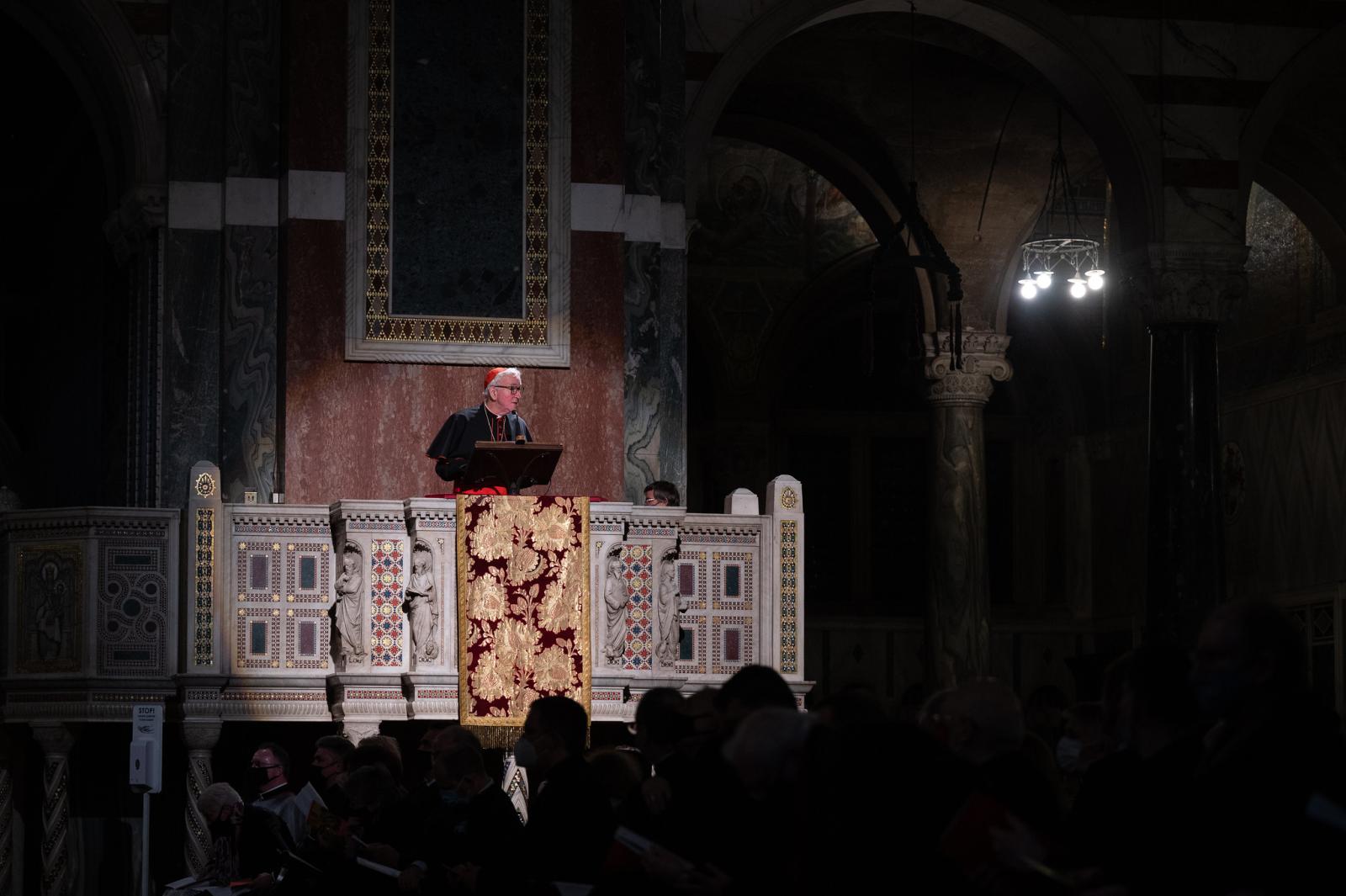Meditation given at the Christmas Celebration concert in Westminster Cathedral on 15th December 2021
In its nearly 120 years of existence, this Cathedral has witnessed much. It has withstood two world wars; been host to the installation of eight Cardinal Archbishops; it has welcomed two Popes. Its presence in this part of London is one of reassurance, permanence, and solidity.
This is in stark contrast with the prevailing mood of the world at this moment. That mood can be summed up, I think, in one word: vulnerability. Making plans seems unwise; trying to predict what might lie next in store for us with this virus is something of a fool’s errand.
This vulnerability marks our lives in these times. It can make us anxious. Clearly, the pandemic, and our responses to it, have affected much more than physical health alone. Vulnerability can take many forms.
A vivid memory comes to mind. Some time ago now I visited a family of refugees in Erbil, in Iraq. They had fled their home in a matter of hours, bringing only what they could carry. Now their home was something of the antithesis of the solidity of this Cathedral. It was a converted shipping container. Outwardly, their circumstances were insecure, desperate even. Yet through it all, there was a serenity, a generous welcome, and a desire to make the most of the little they had. They were determined that uncertainty about the future need not define them. Vulnerability, then, had not overwhelmed them.
For that family, and some of their companions, an unwavering commitment to their faith, in this case their Christian faith, was an enormous strength. I could see this in the honoured place that the crucifix and images of the saints had in their humble home. It was so clear that, for them, the pathways of vulnerability led them more closely along the pathway of faith, walking in solidarity with the experience of the Holy Family. Their faith was a wellspring from which their serenity and their generosity flowed. I left that humble dwelling deeply moved and, in fact, inspired.
So I reflect on this: for us, at this Christmas time, when we are all feeling vulnerable, we have an opportunity to appreciate afresh the circumstances of the first Christmas.
We all know the story: of the requirement of the governing power for its citizens to comply with its edicts, in that case of registration in the town of birth, the difficult journey, the impossibility of finding accommodation, the harsh temperatures of the winter. We don’t always like to think of that. Sometimes, in our mind’s eye, the animals are cuddly rather than smelly; the bedding in the manger is soft hay, not scratchy straw. Sometimes we gloss over the harder aspects of the Christmas story. Yet in this year, more than ever, they can offer us consolation.
Here we remember that God has chosen the birthplace of the ‘great little one’ to be the vulnerability of the manger. He enters in weakness. The angels’ triumphant song, ‘Glory to God in the highest’, was sung in full knowledge of the circumstances which gave rise to it. That glory is not dimmed because of the straightened situation of the stable in Bethlehem. No, that glory was there, and is there, for the eyes of faith to discern. Here, then, we learn that our own uncertainties, anxieties and miseries are themselves not barriers that shut out the light and love of God from our lives. Rather, as we assert so often in our Christmas proclamations, this is a light that shines into our darkness.
In the Incarnation, we see the brightness of eternity touching our world and our humanity in all its dispositions and situations: sinful and faithful, secure and fragile. That is more than reason enough for the angels’ song to resonate with us this year, as every year. As Pope St Leo the Great wrote, ‘It isn’t right to allow sadness any room when Life is born, taking away the fear of death and, with eternity promised us, filling us with joy.’
It is so right, then, that we express this joy in the comforting rituals of Christmas. It is such a pleasure to be able to sing again the well-loved carols, to hear the familiar readings, perhaps to cast our minds back to years gone by, remembering the company of family and friends who have gone before us. But if the situation of the world this year is to teach us anything tonight, it may be this: that the passing insecurities of the world do not limit the love that the Christ-child, the Word made flesh, has for us. His determination to save us is total; his promise of eternal life is real. He reaches out in love to the world, and to us, just as we are, with all our sins and doubts and contradictions.
At Christmas, we are assured again that heaven has come to dwell on earth, and God in Man; a reality that is utterly secure, giving a joy that no sin, no vulnerability, no pandemic, can dislodge. Tonight, then, we look forward to Christmas, and set our course towards a new year, with joy in our hearts, a joy that is sure and eternal.
Amen.
✠Cardinal Vincent Nichols
Archbishop of Westminster
Photo: Mazur/CBCEW.org.uk
